DAVE'S DIARY - 8 APRIL 2006 - CINDY WALKER OBITUARY
CINDY
WALKER RIP @ 87
CINDY WALKER - BORN MART, TEXAS - JULY 7, 1918
DIED MEXIA, TEXAS - MARCH 23, 2006
HONOURED BY WILLIE AT HAPPY HOUR
"You give your hand to me/ and then you say hello/ and I can hardly speak/ my heart is beating so/ any anyone could tell/ you think you know me well/ but you don't know me." - You Don't Know Me - Cindy Walker.
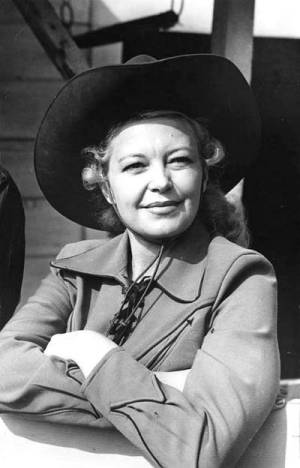 Cindy Walker |
Timing
and longevity are sure-fire recipes for success in music. "She affected me and everyone else who came along after her," Willie said on the eve of the death of the singer songwriter and former Hollywood actress renowned for her western movies. |
"We
had to have heard her music before we could do ours."
Walker suffered ill health following the death of her mother Oree - daughter
of gospel songwriting legend F L Elland (Hold to God's Unchanging Hand)
in 1991.
It was Oree, an exceptional pianist, who crafted Cindy's simple, direct
melodies into full-fledged compositions.
Cyndi suffered from respiratory problems and was rushed from her home
to a Mexia hospital around 8 p.m. on Thursday March 23 but died shortly
afterwards.
She was wed once - for a short time - but lived out her life in the three-bedroom
house her brother bought for their mother 52 years ago at Mexia, 40 miles
east of Waco.
Cindy rose at dawn, made black coffee and went upstairs to write her evocative
songs on her floral patterned typewriter.
TEXAS COOKING
Although
the Walker family moved back to Texas in 1954 they kept an apartment in
Nashville where they spent three months each year pitching her songs.
They would sweeten deals by inviting music industry people by for a plate
or two of her mother's delectable Southern cooking.
Cindy wrote more than 500 songs in a career spanning seven decades and
was the first woman inducted into the Nashville Songwriters Hall of Fame
in 1970.
Although she was worshipped by friends and younger artists and songwriters
Walker said she didn't really like too many visitors.
"You can't write good songs with company dropping in," she said
in 2004.
Walker guarded her privacy. When she granted interviews, she stipulated
that her age not be given. She worried that she might be regarded as too
old to write contemporary songs.
Most Walker stories reported she was a spinster but she confessed to a
"short lived marriage" in a New York Times interview but declined
to discuss it.
Walker did not consider herself a feminist pioneer.
She often said the music industry would welcome a potential hit written
by anyone - even an orangutan.
She declined to hang her awards on the wall - she kept them under her
bed.
"Worldly things were of little meaning," her niece Carol Adams
told The Associated Press.
"She lived for hamburgers, ice cream, pencil and paper."
Walker was survived by three nieces.
RECORDING AND WRITING DEBUT
"Dusty skies, I can't see nothing in sight/ good old Dan, you'll have to guide me right/ if we lose our way the cattle will stray/ and we'll lose them all tonight/ cause all of the grass and water's gone/we'll have to keep the cattle movin' on." - Dusty Skies - Cindy Walker.
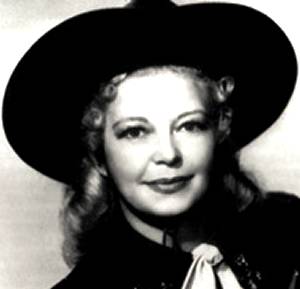 |
Walker
was briefly a Decca recording artist, hitting the #5 with When
My Blue Moon Turns To Gold Again (which she didn't write) in 1944. It also made #19 for Elvis Presley in 1956. Cindy played a sexy cowgirl in "soundies" - the three-minute flicks played between Western double features and embryo of today's video clips. But songwriter was her true love and forte. "Cindy Walker never wrote a bad song in her life," producer Foster said two years ago when the prolific first lady of country songwriting was feted with a tribute concert at the Paramount Theatre in Austin. |
She started
writing songs, including future Bob Wills hit Dusty Skies at age
12.
Walker wrote the song after finding newspaper clippings about the Dust
Bowl in her grandmother's musty attic.
"It broke my heart," Walker told Daniel Cooper - the writer
of Willie's Cindy tribute disc liner notes.
"And I had to write it to get over it and I did."
Just 10 years later, Walker received her first songwriting credit when
Bing Crosby recorded Lone Star Trail in 1941.
FROM TEXAS TO HOLLYWOOD
"When its' sugar cane long round about June/ I'll be walkin' with Sugar neath that old Sugar Moon." - Sugar Moon - Cyndi Walker-Bob Wills.
Cindy Walker
was born at Mart, Texas, during the final stanza of World War 1.
Her career started in the thirties at the Casa Mañana in Fort Worth.
"Well, I talked to impresario Billy Rose and told him I was the best
dancer in Texas, and got Papa to drive me to Fort Worth for the audition,"
Cindy told Austin Chronicle writer Jerry Renshaw in 2004.
"I was hired right away. I had my guitar with me, and that's when
I wrote Casa de Mañana. Paul Whiteman heard it and said, "That's
the song I've been looking for to open my shows with." That's the
first song I had ever played, though I wrote Dusty Skies when I was 12.
I've always written songs."
Her father Aubrey, a cotton buyer, and mother Oree - a musician - took
her to Los Angeles by car in 1941 during World War II.
Cindy insisted her father stop the car when she saw a Sunset Boulevard
building that housed Bing Crosby's offices.
An impromptu meeting with Bing's brother Larry led to Bing recording Lone
Star Trail.
In Hollywood Walker also landed a recording contract with Decca Records
and began writing songs for singing cowboys.
Now, 60 years down the celluloid track, her songs are still used in movies
- In God's Hands (1998) and My Best Friend's Wedding (1997)
- and more recent pictures.
It was also in Hollywood that Cindy first met Bob Wills, who recorded
more than 50 of her songs, including more than 39 featured in his movies.
Walker's tenure on the West Coast also led to her hits being sung in movies
by Gene Autry and other singing cowboys.
Cindy was also a tireless song plugger with her tunes cut by artists diverse
as Bette Midler, the Byrds, Cher, Jerry Wallace, Dianna Krall and Michael
Nesmith.
"I'm not intimidated by anyone," Walker said.
"My father (a cotton buyer) didn't know the music business at all,
but he told me to treat it like any other business. Know the market and
sell, sell, sell."
BOB WILLS BUBBLES
"Oh, I know my life's been a failure/ and I've lost everything that I hold dear/ and the dreams I once dreamed now are empty/as empty as the bubbles in my beer." - Bubbles In My Beer - Cindy Walker-Bob Wills-Tommy Duncan.
| Walker
had a knack for crafting songs to the strengths of certain artists.
She has a special relationship was with Wills - The King of Western Swing. He recorded more than 50 Walker songs, including Cherokee Maiden, Dusty Skies, Bubbles In My Beer and Bluebonnet Lane. They were all pitched to Wills on a single afternoon in Los Angeles in the 1940s. Cherokee Maiden was a #1 hit by 1 by Merle Haggard in 1976 and also cut by Asleep at the Wheel and Willie Nelson. "Well, I wrote Cherokee Maiden and Bluebonnet Lane for Bob Wills and was gonna send them to Cain's Ballroom in Oklahoma," Walker told Renshaw. |
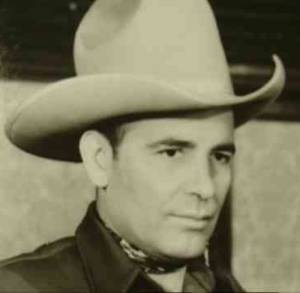 Bob Wills |
"I went
out to mail the package, and here comes a bus down the street that says
"Bob Wills & His Texas Playboys," so I didn't mail it! I
ran home and called all the hotels and found him at the Hollywood Plaza.
Wills wasn't there, but his manager O.W. Mayo was, and I played him those
two songs and Dusty Skies, and he brought Bob over there when he
got into town. I sang 'em for him, and he did five of my songs."
Renshaw: You wrote all the songs for Wills' movies?
Cindy: Yes, 39 songs. They didn't turn down one of them. They were in
eight movies.
Renshaw: It must have been a great thrill to see him do your songs live.
Cindy: Oh, it was. And when Tommy Duncan sang Dusty Skies, he cried.
But I didn't think of songs as being hits, I just wrote them. I still
write 'em like that. Some people ask me why You Don't Know Me has
Eddy Arnold's name on the songwriting credits. It happened in Nashville
when I went in to say goodbye to Steve Sholes of RCA and Eddy came in
right about the time I was leaving. He said, "I've got a title that
I want you to write a song around: You Don't Know Me. I said, "Well,
that doesn't sound like much, but I'll think about it." I went home
and wrote it. There's a lot of the music business that I know a lot about,
but I just never thought in those terms, you know?
Renshaw: Were you and Wills close?
Cindy: "I think so, yeah. He'd always ask me for songs. Betty Wills
was his wife; she was very nice to me. Bob was married about five times
or so. He drank, y'know? He had a reputation. But then I was a lot younger
than Bob Wills."
TEXAS RETURN
"One night when the moon was bright/ on a moon lit glade/ that is where I found my little Cherokee maid/ the memory of that night of love/ is lingering yet, and I know I will never forget." - Cherokee Maiden - Cindy Walker.
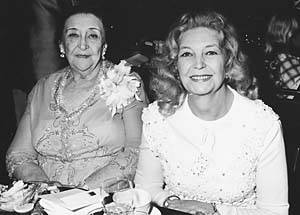 Cindy Walker with mother Oree |
Although
Walker enjoyed her Hollywood days she remained a prolific writer when
she returned to Texas. "Well, you see, I lived in Hollywood for 13 years," Walker revealed. "My mother stayed with me, and my father would tend to his business. My mother was a wonderful piano player, and she made all my demos. But then Papa died in '48, and my brother wrote me and said, "I want you to bring my mother home. I have three little girls and she'll never see her grandchildren unless you bring her home." |
Well, I can write just as good in Texas as in California, so he got me this house in Mexia. But then, I'd go to Nashville for three, four months every year until my mother died."
Walker also
recorded her Words & Music album in 1964.
"I didn't want to make that, but my mother and Fred Foster kept after
me," said Cindy - a member of at least 10 halls of fame including
Nashville, Texas, California and the Cowgirls.
"The way it turned out, though, I was glad I did it."
Long after Bob Wills died at 70 on May 13, 1975, she was still earning
royalties from his legacy because of his tribute discs by Merle Haggard
and Asleep At The Wheel.
ROY ORBISON
It was Foster
who introduced her songs to Roy Orbison, born in Wink, Texas, and also
featured in the Austin based movie Roadie.
"Roy Orbison was recording for Fred Foster, and Fred called me one
day and said, "Write me something for Roy Orbison," she recalled.
"I wrote Shahdaroba, Wishin' on a Star, and Dream Baby.
I put 'em in a box, and then my mother came by and said, "What'd
you take out of the box?"
"I took out Dream Baby because I thought it was monotonous."
She said, "Well, if you don't send Dream Baby, then you've
got nothing to send! Oh yeah, I thought it was monotonous, you know, "Dream
baby, doo doo doo do doo". Well, then Fred Foster called me about
two weeks later and said, "How's the weather down there?" I
said, "Well, pretty cold," and he said, "Let me play something
over the phone that'll warm the cockles of your heart." And he played
me Dream Baby. Roy did such a great job I nearly fainted."
Walker said she later met Orbison.
"I met him several times, yes," she said.
"He was very polite, but very stiff. He had a hard life, you know.
His wife died in that motorcycle crash, and his sons died in a house fire.
He was very dignified and reserved, kinda shy."
ELVIS PRESLEY AND ERNEST TUBB
Walker also
had her music covered by covered by Elvis Presley."
Elvis Presley recorded You Don't Know Me for one of his movies
- he also cut When My Blue Moon Turns To Gold Again.
"That's not my song," Walker said of the latter penned by another
Walker.
"A lot of people seem to think that, but it was written by Wayne
Walker, and since my last name is Walker. But he's not kin to me. I sang
that song for Decca but I didn't write it.
Everyone seems to think that."
Walker always held her ground where her songs were concerned.
Ernest Tubb wanted to record Walker's China Doll but wanted to
change the line "tiny pale hands" to "little brown hands."
Walker refused. The china doll in her mind had tiny pale hands.
Tubb declined to record the song, which was taken to the pop charts by
the Ames Brothers.
HITS BY THE BUSHEL
"Now I don't care if I'm not the first one you kissed/ just so I'll be the last/ and I don't care if I'm not the first you've caressed/ darlin' I'll never ask." - I Don't Care - Cindy Walker-Webb Pierce.
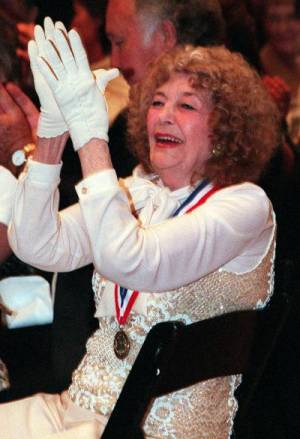 |
Although
Eddy Arnold's 1956 recording of You Don't Know Me only reached
#10 on the charts, their co-write is acknowledged as one of the
greatest country classics. You're From Texas - a #2 hit for Wills in 1944 - was covered by Asleep at the Wheel, Roy Rogers, Charlie Walker and Billy Mize. |
Take Me
in Your Arms (and Hold Me) was #1 for Eddie Arnold in 1950 and 30
years later it peaked at #10 as a duet recording for Jim Reeves and Deborah
Allen.
Dream Baby (How Long Must I Dream) was #4 for Roy Orbison on pop
charts in 1962 and also cut by Glen Campbell, Jerry Lee Lewis and Waylon
Jennings.
Walker scored with Hank Snow's The Gold Rush Is Over and The
Next Voice You Hear and George Morgan's I Love Everything About
You.
Other Walker hits include Gene Autry's Blue Canadian Rockies, Jim
Reeves' Distant Drums and Anna Marie, Sonny James' Heaven
Says Hello and Jerry Wallace's In the Misty Moonlight.
Walker was still writing songs shortly before she died.
She penned Is It Love that was cut as a demo by Rich O'Brien and
Leon Rausch.
Walker noted that producer Foster earmarked the song for Norah Jones.
MOVIE SONGS
Cindy's songs
have been a highlight of movies since the 1940's.
They include -
In God's Hands (1998) - You Don't Know Me.
My Best Friend's Wedding (1997) - You Don't Know Me
Roy Orbison and Friends: Black & White Night (1988) (TV) - Dream Baby
Winning of the West (1953) - Cowboy Blues
The Lady Confesses (1945) - It's All Your Fault
Silver City Raiders (1943) aka Legal Larceny (UK)
Saddles and Sagebrush (1943) aka The Pay Off (UK)
A Tornado In the Saddle (1942) aka Ambushed (UK)
Trail to San Antone (1947) (uncredited)
Throw a Saddle on a Star (1946) (song)
She Has What It Takes (1943) (songs)
Riders of the Northwest Mounted (1943) (song)
Frontier Vengeance (1940) (song)
MOVIE ROLES
TI-Yi-Yippee-Aye
(1944) - Vocalist
Bearcat Mountain Gal (1942) - Vocalist and dancer
Frontier Vengeance (1940) - Vocalist
Ride, Tenderfoot, Ride (1940) - Vocalist
http://www.braindumps.com/642-874.htm
http://www.test-king.com/exams/300-208.htm
http://www.mica.edu/
http://www.actualtests.com/exam-CAS-001.htm
http://www.certkiller.com/exam-300-209.htm
http://www.emc.com/